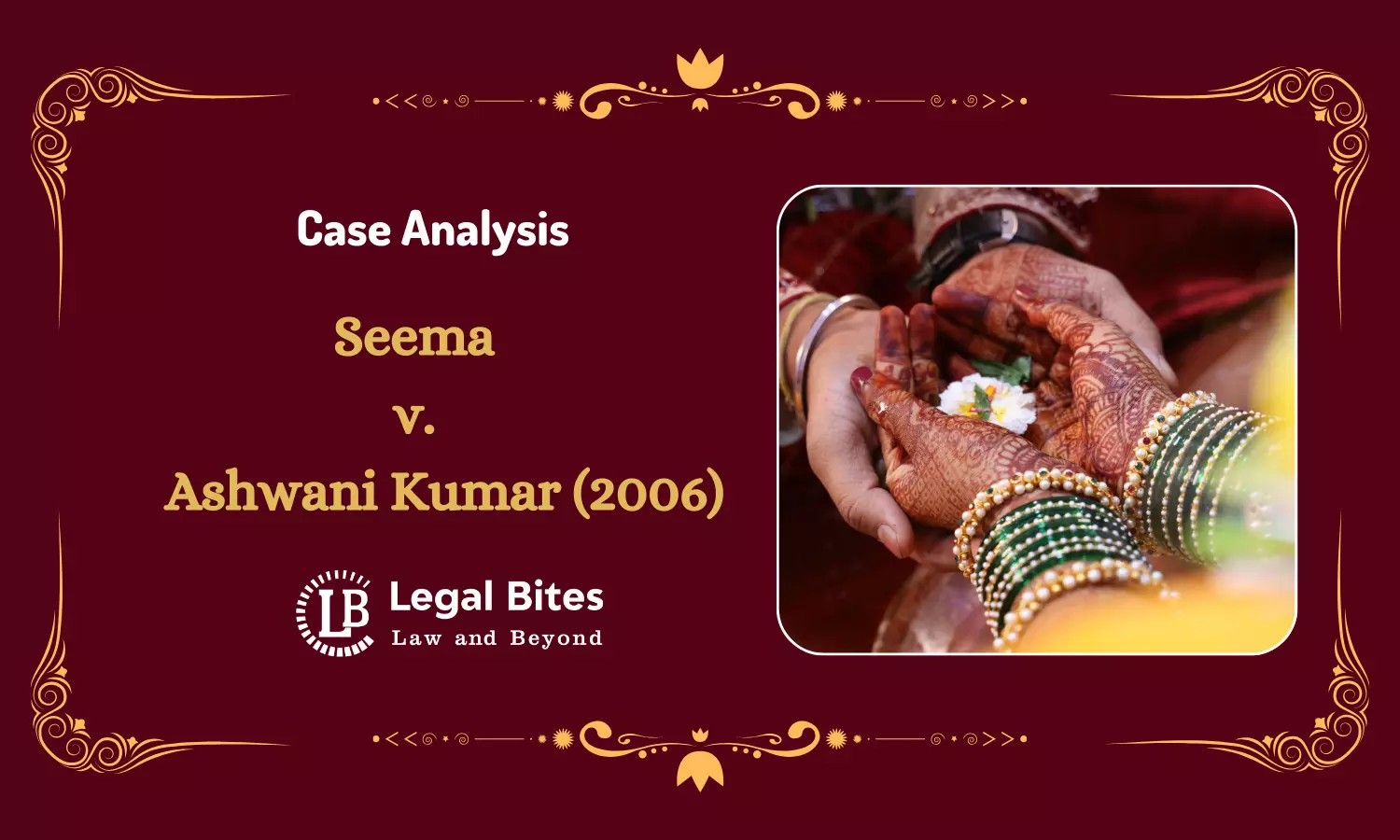Case Analysis: Seema v. Ashwani Kumar (2006) | Registration of Marriage
In Seema v. Ashwani Kumar, the Supreme Court emphasized mandatory marriage registration for all, setting a precedent for upholding individual rights.

The Supreme Court has underlined the essentials of compulsory registration in the case of Seema v. Ashwani Kumar. This would be instrumental in halting child marriages, safeguarding the minimum age of marriage, curbing bigamy/polygamy, enshrining a married woman’s right to claim marital rights, discouraging men from deserting women, and condemning trafficking disguised as marriage.
Case Title: Seema v. Ashwani Kumar
Court: Supreme Court of India
Citation: 2006 (2) SCC 578
Judges: Hon’ble Justice Arijit Pasayat & Hon’ble Justice S.H. Kapadia
Date of Judgment: 14th February, 2006
Facts
- During a transfer petition hearing, it was noted with concern that many unscrupulous individuals are denying marriages due to the lack of official marriage records in most states.
- From the Rigvedic age, marriage was a well-established institution among the Aryans in India, with a high ideal of marriage.
- The Convention on the Elimination of All Forms of Discrimination Against Women (CEDAW) was adopted by the UN in 1979. India signed it on July 30, 1980, and ratified it on July 9, 1993, with a reservation regarding compulsory registration of marriages, citing the impracticality due to India's diversity.
- The Supreme Court of India noted the lack of official marriage records in many states, leading to denials of marriage existence by unscrupulous individuals.
- Several Indian states have enacted laws for the compulsory registration of marriages. Notable among these are the Bombay Registration of Marriages Act (1953), and the Karnataka Marriages (Registration and Miscellaneous Provisions) Act (1976). Despite these provisions, many states still follow a system of voluntary marriage registration. Specific Acts include: Special Marriage Act (1954), Indian Christian Marriage Act (1872), Parsi Marriage and Divorce Act (1936) and Hindu Marriage Act (1955) (Section 8 allows for registration but does not mandate it)
- National Commission for Women supported compulsory marriage registration to address various women-related issues, such as the prevention of child marriages, illegal bigamy/polygamy, and ensuring women's rights in matrimonial matters.
Issues
- Whether the registration of marriage should be made compulsory?
- Whether such a provision holds constitutionality or not?
Judgment
The court later called upon States and Union Territories to notify the procedure for registration within three months, amend existing rules, or frame new rules as well.
The public should be given a notice inviting their objections before setting up the rules in force with further public announcements being made and the issue left open for public objections for one month.
Marriages shall be registered by an officer appointed by the rules of the states and shall be entitled to demand the age, the marital status (single, divorced) and by the provisions of the rules, sanctions for non-registration or false statement. The rule aims to implement the instructions of the court.
The Supreme Court referred to Entries 5 and 30 of List III of the Seventh Schedule of the Constitution of India, which read:
“marriage and divorce; infants and minors; adoption; wills, intestacy and succession; joint family and partition; all other matters relating to which parties in legal proceedings were immediately before the commencement of this constitution subject to their customary law Vital statistics; registration of births and deaths. ”.
The court suggested making registration of marriage compulsory since the production of the certificate would provide reliable evidence of the rights and duties of the couple in marriage whenever such issues were contested. The registration of marriage as we all know it, comes with some essentials, which include the age of the bride and the groom, which will assist in the eradication of the social vice of child marriage.
One of the effects of making the Registration of Marriage compulsory is that it has reduced the menace of child marriage which was common at that particular time. The Court formulated the decision based on the provisions of the Constitution of India and conferred equal rights on both the State and Central Government to make laws governing marriage and divorce including marriage registration.
The Supreme Court held:
"Marriages of all persons who are citizens of India belonging to various religions should be made compulsorily registrable in their respective States, where the marriage is solemnized."

